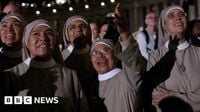Catholic cardinals from around the world have begun the process of selecting a new pope in what is being described as one of the most unpredictable conclaves in history. The conclave commenced on Wednesday, May 7, 2025, in the Sistine Chapel, following the death of Pope Francis last month at the age of 88. With 133 voting cardinals participating, this conclave marks the largest gathering of its kind, and the stakes are high as the church seeks a leader to navigate its future amidst ideological divides.
Since April 28, 2025, the cardinals have held daily meetings, but achieving consensus has proven challenging. Ignatius Suharyo Hardjoatmodjo, the archbishop of Jakarta, expressed the sentiment of many, stating, “There’s a lot of confusion. We have heard many voices; it’s not easy to draw conclusions.” On Tuesday, May 6, the cardinals moved into seclusion at Casa Santa Maria, where they surrendered their phones and isolated themselves from the outside world, pledging secrecy during the voting process.
Voting occurs twice daily, with smoke signals indicating the results. Black smoke signifies that no decision has been made, while white smoke will announce the election of a new pope. After two rounds of voting on Thursday, May 8, black smoke billowed from the Sistine Chapel chimney at 11:50 a.m. local time, indicating that the cardinals had yet to reach the necessary two-thirds majority. This marked the second day of voting without a pope being elected.
Speculation about potential papabile candidates has been rampant, with over 20 individuals mentioned as possible successors. Among the frontrunners are U.S. Cardinal Robert Prevost, described by Crux as possessing “solid judgment and a keen capacity to listen,” and Filipino Cardinal Luis Antonio Tagle, often referred to as “the Asian Francis.” Tagle is known for his charismatic presence and has garnered significant support, but he, along with other candidates, has faced scrutiny over the church's handling of abuse cases.
Other progressive candidates include Matteo Zuppi, Pierbattista Pizzaballa, Jean-Claude Hollerich, Timothy Radcliffe, and Michael Czerny. Traditionalist figures like Péter Erdő and Robert Sarah are also in the mix, with U.S. Cardinal Raymond Burke and Germany’s Gerhard Müller advocating for a more conservative direction. Müller has warned that failure to elect an orthodox pope could lead to a schism within the church.
Despite the diverse range of candidates, the cardinals seem to agree on the need for a leader who can act as a “bridge and a guide for a disorientated humanity,” according to a Vatican official. Andrea Vreede of Dutch broadcaster NOS noted, “These men of faith are entering [the conclave] believing that God has already chosen the next pope. It is unpredictable because there are many new electors who do not know each other very well… So the one thing they can agree on, whether they are far left or far right, is that they all want more involvement in the government of the next pope.”
Severina Bartonitschek of Germany’s KNA added, “I think they already have someone in mind. And the main job for the new pope will be unifying the church… Yes, he will have to handle evangelization but also issues like the abuse cases. We need to have a pope who is not afraid to fight against this issue.”
The conclave is not only a pivotal moment for the Catholic Church but also a significant event for millions of followers around the globe. The Vatican has estimated that around 45,000 people gathered in St. Peter’s Square on the first day of the conclave, eagerly awaiting news of a new leader. The atmosphere is charged with anticipation, as the cardinals engage in their solemn task.
As the conclave continues, the cardinals are expected to hold up to four votes each day until a pope is elected. The average length of a conclave in recent decades has been about three days, but the outcome remains uncertain. Historical context shows that the last two popes, Francis and Benedict XVI, were elected on the second day of their respective conclaves, raising hopes that a new pope could emerge soon.
However, the cardinals’ discussions reflect deep ideological divides within the church, and many observers believe that the election process could extend beyond the average duration. The last conclave that lasted into a third day was in 1978, when Pope John Paul II was elected. The last time a conclave extended to four days was in 1958, with Pope John XXIII.
As the world watches closely, betting odds have emerged around potential candidates, with Pietro Parolin and Luis Antonio Tagle being favored in various markets. Polymarket has Parolin at a 28 percent likelihood and Tagle at 20 percent, while Kalshi shows similar trends. This surge in interest reflects not only the significance of the papal election but also the changing dynamics of the Catholic Church.
In the end, the election of a new pope will not only determine the future direction of the Catholic Church but will also resonate deeply with its global congregation. The next leader will have the monumental task of addressing pressing issues such as abuse scandals, the church's role in contemporary society, and the need for unity among its followers. As the conclave unfolds, the world awaits the emergence of a new spiritual leader, one who will guide the faithful through the challenges that lie ahead.




